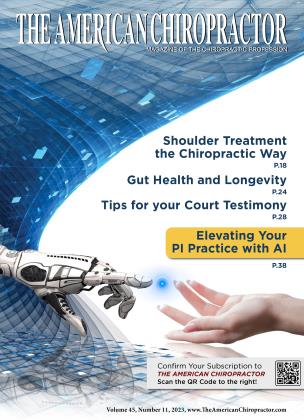Restorative Sleep
IN BRIEF
RECOVERY
An Essential Necessity of Peak Performance
Andrea Holmes
PhD.
Athletes often think of high-level performance and restorative recovery as two separate approaches in their health and wellness plans. This often leads to focusing too much on the more action-oriented component (performance), while the more passive element (recovery) is a lower priority.
In the chiropractic world, recommended recovery regimens often focus on exercises and stretches. However, it is important to explain to chiropractic patients that the relationship between exercise and rest is symbiotic.
Recent studies of elite athletes have shown that good sleep significantly influences their performance across a range of activities, including reaction time, accuracy, and endurance (Charest & Grandner, 2019). Poor quality sleep, on the other hand, can increase the risk of injury and result in lack of physical and cognitive performance. Therefore, chiropractic patients should build quality sleep into their recovery protocol.
However, there are many differences in sleep quality, especially when over-the-counter sleeping aids like melatonin are used. Melatonin has been shown to cause adverse side effects, such as dizziness, drowsiness, and headaches (Menczel Schrire, 2022). It is imperative to use the right nutraceutical sleep aid that helps patients achieve a restful quality sleep because truly restorative rest is not only measured by the length but also by the quality of sleep.
Alternatives to melatonin with high safety profiles include botanicals and extracts such as chamomile, lavender, myrcene, valerian root, passionflower, hops, and extracts from Cannabis sativa. Hemp is one form of cannabis with less than 0.3% THC and contains cannabidiol (CBD) and cannabinol (CBN). These nonpsychotropic cannabinoids do not induce a “high,” have a calming effect on the central nervous system and are promising candidates for treating chronic inflammation (Lewis et al., 2019) (Zurier & Bur stein, 2016). Chiropractors should be encouraged to recommend a nutraceutical supplement containing cannabinoids to help their patients with sleep and pain management.
Dr. Andrea Holmes, Ph.D. (Chemistry) is Chief Science Advisor at SummaForte providing leadership in functional product formulations. She has served in leading company and academic roles and received the National Science Foundation’s Presidential Early Career Award for her cutting-edge research in cannabis. Contact her at [email protected] or 917-805-0888.
References:
1. Charest, J., & Grandner, M. A. (2020). Sleep and Athletic Performance: Impacts on Physical Performance, Mental Performance, Injury7 Risk and Recovery, and Mental Health. Sleep Medicine dimes, 15(1), 41-57. https://doi.Org/10.1016/i. ismc.2019.11.005
2. Menczel Schrire, Z., Phillips, C. L., Chapman, J. L., Duffy, S. L., Wong, G., D’Rozario, A. L., Comas, M., Raisin, I., Saini, B., Gordon, C. J., McKinnon, A. C., Naismith, S. L., Marshall, N. S., Grunstein, R. R., & Hoyos, C. M. (2022). Safety of higher doses of melatonin in adults: A systematic review and meta-analysis. Journal of Pineal Research, 72(2), el2782. https://doi.org/10.llll/ipi.12782
3. Shannon, S„ Lewis, N., Lee, H., & Hughes, S. (2019). Cannabidiol in Anxiety and Sleep: A Large Case Series. The Permanente Journal, 23,18-041. https://doi. org/10.7812/TPP/18-041
4. Zurier, R. B„ & Burstein, S. H. (2016). Cannabinoids, inflammation, and fibrosis. FASEB Journal: Official Publication of the Federation of American Societies for Experimental Biology, 30(11), 3682-3689. https://doi.org/10.1096/fj.201600646R
 View Full Issue
View Full Issue






